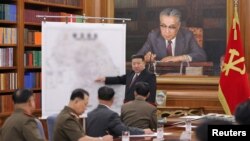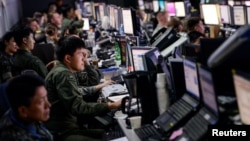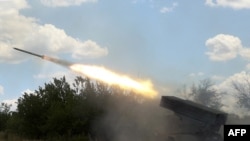North Korean leader Kim Jong Un and his top military brass met to discuss bolstering war plans, conducting more tests of the country’s latest weaponry, and boosting weapons production, state media said Thursday.
The announced actions are the latest in a string of moves made by North Korea in defiance of international sanctions and criticism, to achieve its stated military hardware goals towards a hope of acquiring relevance on an increasingly fractured global stage.
The enlarged meeting of the party’s Central Military Commission took place Wednesday to make “the army more thoroughly gird for a war, given the grave political and military situation prevailing in the Korean peninsula,” state media KCNA said.
It warned of “plans for offensive military countermeasures to thoroughly deter” the “chief culprits,” a likely reference to South Korea and the United States, which are set to engage in annual, large-scale military exercises later this month.
The Ulchi Freedom Shield drills, which North Korea views as a warm-up to war, are scheduled for August 21 to 24.
Images showed military leaders convening at Kim Jong Un’s private library, as Kim pointed to a blurred-out map of the Korean peninsula, to points that could be Seoul, South Korea’s capital, and a military headquarters.
Kim Jong Un “called for actively conducting actual war drills to efficiently operate newly deployed latest weapons and equipment,” KCNA said. He also set a new goal to boost “weapons production capacity.”
The directive comes about a week after Kim began touring several weapons factories, including one producing shells of large-caliber multiple rocket launchers, according to a Sunday state media report. Kim “expressed great satisfaction”, KCNA said, praising what it said were automated processing systems which produced higher quality, precise weapons.
Soviet-era Grad missiles with North Korean lettering were being used by Ukrainian forces near the city of Bakhmut, a July 29 Financial Times report said, mere days after Russian Defense Minister Sergei Shoigu returned from his high-profile visit to North Korea and its weapons expo.
The 120mm multiple-launch rockets were described by Ukrainian soldiers as “very unreliable” and prone to do “crazy things”, with most manufactured in the 1980s and 1990s.
How the rockets got from North Korea to the Russia-Ukraine war across the globe remains unconfirmed. But Pyongyang’s latest public announcement to spur production of its modernized artillery suggests it is not shying away from promoting potential new and illicit exports.
A hot summer
Analysts expect military activity on the Korean peninsula could ramp up in the lead-up to a trilateral summit among President Joe Biden, Japan’s Prime Minister Fumio Kishida and South Korea’s President Yoon Suk Yeol in the United States next week.
The two Asian leaders will be Biden’s first guests at Camp David on August 18, a presidential retreat site iconic for hosting consequential foreign policy discussions.
Seoul and Tokyo have been repairing their diplomatic relations to bolster a trilateral security partnership with the U.S. against North Korea’s consistently progressing weapons program.
“The president is looking forward to hosting both of these leaders… at Camp David for what we believe is a discussion of historic proportions in terms of the importance of this trilateral relationship to the Indo-Pacific region and frankly to the world,” said John Kirby, NSC communications coordinator, in a virtual press briefing on Wednesday.
He did not specify an agenda, but added there will be “an awful lot to discuss over the course of the discussions at Camp David.”
Since Shoigu’s visit to North Korea late last month, several Biden administration officials have warned against any type of military transfer between the Cold War allies. Pyongyang is banned under United Nations Security Council resolutions from selling its military hardware.
Any arms deal would be “extremely concerning to us,” said Defense Department spokesperson Sabrina Singh this week, adding that such transactions are being monitored and would be met with sanctions as Washington conducts its due diligence in exposing illicit behavior.
Opaque transactions
Even so, a state TV program on Pyongyang’s (delete North Korea's) 70th Korean War-end anniversary celebrations last month declared that the North would deepen its defense cooperation with Russia, citing leader Kim Jong Un’s meetings with Russia’s top defense head Sergei Shoigu.
Within North Korea, Shoigu’s visit was given prominence usually reserved for state leaders. Elsewhere, it has raised concern about what could be transpiring behind closed doors.
Many analysts and government officials agree the very rare visit by a Russian defense minister showed Moscow’s desperation to acquire artillery and conventional weapons to support its war in Ukraine, which continues to burn up more firepower than it is able to supply.
And while some believe North Korea could be rewarded with much-sought foreign currency or Russian oil, others note a more long-term asset: technological know-how to fill the gaps in its missile program.
“What North Korea wants from Russia is technology,” Kim Yeoul Soo of the Korea Institute for Military Affairs told VOA. “For example, technology to mount multiple nuclear warheads [on its ICBMs], for their reentry. North Korea failed its last satellite test. They need state-of-the-art video equipment for its satellite to have the functionality of a spy satellite.”
Others note Moscow is under its own hard currency pressure, which could facilitate conditions for a trade over a sale. “I assume [North Korea] will be sending drones. They make two drones – one that looks like the Reaper and one that looks like the Global Hawk,” said Bruce Bennett of the RAND Corporation to VOA Korean.
“Given the economic sanctions on Russia [it] may be such that they can’t continue buying [drones] from Iran or have a very limited ability to buy from Iran. And so, they will want to… get some from North Korea,” he explained. “They would send not only the weapons but also experts to monitor what happens. That would be a great testing ground.”
Further fanning suspicions of newly negotiated deals was an overnight visit of a Russian VIP plane to Pyongyang last week, according to the news site NK News, which cited flight tracking data and satellite imagery.
Whatever relations Moscow enjoyed with Seoul and Tokyo prior to its war in Ukraine appears all but decimated, Go Myong-hyun, senior fellow at the Asan Institute told VOA.
Referring to the image of Shoigu standing side-by-side to Kim Jong Un at the July military parade as various strategic ballistic weapons were showcased, Go added Shoigu “watched these weapons systems that Seoul and Tokyo are feeling very threatened by… [essentially] saying that this is okay. I think it has undermined Russia’s long-term prospects in this region for good.”
VOA's Korean service and Lee Juhyun contributed to this report.






